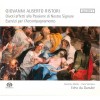Composers
Giovanni Alberto Ristori (1692 - 7 February 1753) was an Italian opera composer and conductor.
He is thought to have been born in Bologna, and was the son of Tommaso Ristori, the leader of an opera troupe belonging to the King of Poland and Elector of Saxony August II the Strong (based in Dresden). August II 'loaned' his opera troupe to the Russian Empress Anna for the celebration of her coronation in Moscow. Ristori died in Dresden.
Calandro, his opera in three acts to a libretto by Stefano Benedetto Pallavicino, was both the first opera buffa written in Germany and also the first Italian opera performed in Russia. It was given under his, and his father's direction, with thirteen actors and nine singers including Ludovica Seyfried, Margherita Ermini and Rosalia Fantasia, in 1731 in Moscow.
In 1916 the German musicologist Curt Rudolf Mengelberg published the first study on Ristori and his music: Curt Rudolf Mengelberg, Giovanni Alberto Ristori: ein Beitrag zur Geschichte italienischer Kunstherrschaft in Deutschland im 18. Jahrhundert (Leipzig: Breitkopf & Härtel, 1916). Although short on biographical details it is a landmark publication because Mengelberg had access to many Dresden music sources now missing. This applies especially to Ristori’s sacred music; prior to 1945 Ristori’s sacred music was held both in score and parts by the Dresden State Library (today, Dresden State and University Library (SLUB)). Fortunately, copies of Ristori's sacred music have recently been turning up in Czech and Polish music libraries, enriching our knowledge and understanding of his music. Currently, the Icelandic independent musicologist Jóhannes Ágústsson is working on a new biography of Ristori, drawing on his years-long extensive research in Dresden and European archives. Ágústsson’s article "Giovanni Alberto Ristori at the Court of Naples 1738-1740" (Studi pergolesiani – Pergolesi studies 8, eds C. Bacciagaluppi, H.-G. Ottenberg and L. Zoppelli, Bern, Peter Lang, 2012, pp. 53-100), introduced many new biographical details about the Italian composer. Of special interest here is the previously unknown information about Ristori’s role as the royal music teacher of the Saxon princess Maria Amalia (1724-1760), later Queen of the Two Sicilies and Queen of Spain.
Some of Ristori’s most important works have now been recorded and released on CD, see list below; as a result, we now have a fairly good idea of his compositional style. Along with his colleagues and contemporaries in Dresden, the court composers Johann David Heinichen, Jan Dismas Zelenka and Johann Adolph Hasse, Ristori played a vital part in shaping the sound of the Dresden Hofkapelle – the most important court orchestra of the late baroque period.
Biography
Giovanni Alberto Ristori (1692 - 7 February 1753) was an Italian opera composer and conductor.
He is thought to have been born in Bologna, and was the son of Tommaso Ristori, the leader of an opera troupe belonging to the King of Poland and Elector of Saxony August II the Strong (based in Dresden). August II 'loaned' his opera troupe to the Russian Empress Anna for the celebration of her coronation in Moscow. Ristori died in Dresden.
Calandro, his opera in three acts to a libretto by Stefano Benedetto Pallavicino, was both the first opera buffa written in Germany and also the first Italian opera performed in Russia. It was given under his, and his father's direction, with thirteen actors and nine singers including Ludovica Seyfried, Margherita Ermini and Rosalia Fantasia, in 1731 in Moscow.
In 1916 the German musicologist Curt Rudolf Mengelberg published the first study on Ristori and his music: Curt Rudolf Mengelberg, Giovanni Alberto Ristori: ein Beitrag zur Geschichte italienischer Kunstherrschaft in Deutschland im 18. Jahrhundert (Leipzig: Breitkopf & Härtel, 1916). Although short on biographical details it is a landmark publication because Mengelberg had access to many Dresden music sources now missing. This applies especially to Ristori’s sacred music; prior to 1945 Ristori’s sacred music was held both in score and parts by the Dresden State Library (today, Dresden State and University Library (SLUB)). Fortunately, copies of Ristori's sacred music have recently been turning up in Czech and Polish music libraries, enriching our knowledge and understanding of his music. Currently, the Icelandic independent musicologist Jóhannes Ágústsson is working on a new biography of Ristori, drawing on his years-long extensive research in Dresden and European archives. Ágústsson’s article "Giovanni Alberto Ristori at the Court of Naples 1738-1740" (Studi pergolesiani – Pergolesi studies 8, eds C. Bacciagaluppi, H.-G. Ottenberg and L. Zoppelli, Bern, Peter Lang, 2012, pp. 53-100), introduced many new biographical details about the Italian composer. Of special interest here is the previously unknown information about Ristori’s role as the royal music teacher of the Saxon princess Maria Amalia (1724-1760), later Queen of the Two Sicilies and Queen of Spain.
Some of Ristori’s most important works have now been recorded and released on CD, see list below; as a result, we now have a fairly good idea of his compositional style. Along with his colleagues and contemporaries in Dresden, the court composers Johann David Heinichen, Jan Dismas Zelenka and Johann Adolph Hasse, Ristori played a vital part in shaping the sound of the Dresden Hofkapelle – the most important court orchestra of the late baroque period.



